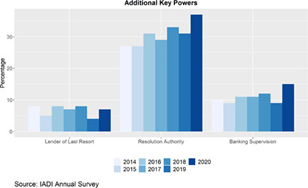Bank deposits increased - a sign of confidence
According to statistics, the amount of deposits into the banking system in 2023 increased. This is considered an indicator of people's confidence in the banking system.
By the end of 2023, capital mobilization of the entire banking system (including capital mobilization from individuals and economic organizations) was at a high level, reaching over 13.82 million billion VND, an increase of nearly 13.5% compared to the end of 2022, in which deposits in VND from individuals increased by about 12.5% compared to the end of 2021. Previously, in the first 11 months of 2023, the amount of deposits in VND from individuals and economic organizations into the banking system increased quite significantly, reaching 11.55% over the same period in 2022 (2022: 7.78%; 2021: 10.12%). According to statistics on SBV's website published on January 15th, as of October 2023, deposits from individuals in banks increased by 422 billion VND compared to September, reaching more than 6.44 million billion VND. This is an unprecedented high level. This reflects the confidence of the people and organizations in the achievement of macroeconomic stability, the safety of the system of credit institutions (CIs), confidence in the domestic currency and the management of the Government and the SBV. This is an advantageous point which also reflects the effort of the entire banking industry in general and of SBV in particular in the past year.
Mobilizing the people's idle money into the banking system will help the system be more proactive and flexible in regulating liquidity and capital supply, creating conditions for reducing loan interest rates for the economy to restore production and business activities after the Covid-19 pandemic, especially in the context of disbursement of public investment capital still being difficult.
According to economic experts, deposit interest rates at banks have sharply dropped recently. However, the amount of deposits is still on the rise, showing that cash flow is still cautious in moving to other channels such as real estates, stocks, or bonds, especially after a series of violations in bond issuance and stock manipulation causing confidence to decline . Furthermore, in the context that production and business activities in 2024 is predicted to face many difficulties and challenges, and the capital absorption capacity of businesses will still be low; Bad debts will have the tendency to increase, the corporate bond market will be quiet..., many people assess that business and investment opportunities will not arise yet. In the world, geopolitical conflicts continue to be complex and unpredictable while the business environment remains unstable. Therefore, even though deposit interest rates are low, people still direct their cash flow into savings channels to ensure capital safety while waiting for clearer business opportunities.
In the market, deposit interest rates are currently very low, mainly ranging from 1.7 - 5.2%. Since the beginning of the year, deposit interest rates at commercial banks have also been continuously adjusted downward.
Since January 2024, 28 banks have reduced deposit interest rates, including BaoViet Bank, GPBank, Eximbank, SHB, Bac A Bank, KienLong Bank, LPBank, OCB, VIB, TPBank, ABBank , NCB, Viet A Bank, Vietcombank, PVCombank, SCB, HDBank, VietBank, Techcombank, Agribank, BIDV, VietinBank, VPBank, SeABank, MSB, Nam A Bank, MB, BVBank.
Among them, OCB, GPBank, SHB, VIB, Bac A Bank, VPBank, Eximbank and VietBank reduced deposit interest rates for the second time since the beginning of January. SHB, NCB, Viet A Bank, and KienLong Bank even reduced interest rates for the third time.
In 2023, the SBV has reduced the policy interest rate four times continuously, with a reduction of up to 2%/year. Along with supporting people and businesses to access capital with more favorable conditions, the lending interest rates of commercial banks have also decreased. They are now at the lowest level in the past 20 years. The interest rate level for new loans has decreased by over 2.5%/year and will continue to decrease in the near future.
With close guidance and practical and timely fiscal and monetary policies from SBV and the Government in recent times, along with positive forecasts on world and domestic economic situations, There will be many credit demand stimulation highlights, creating a driving force for credit growth. The current context of very low interest rates is one of the factors pushing credit demand in the near future.
Continue to strive to reduce lending interest rates
In 2024, the outlook for the global economy and international market developments will continue to be complicated, with high uncertainty in the context of escalating geopolitical conflicts, persistently high inflation, and the trend of maintaining high interest rates continuing in many countries. A few forecasts that inflation and the interest rates increase period around the world will soon end, and interest rates may decline in 2024.
According to experts, the value of the USD will decrease when the US Federal Reserve (Fed) begins to cut interest rates, inflation will still be controlled, and the possibility of SBV having to increase interest rates is unlikely. Meanwhile, there is little room left to reduce policy interest rates.
In Directive 01/CT-NHNN dated January 15th, 2024, on organizing and implementing key tasks of the banking industry in 2024, the Governor of SBV requested units under SBV to: Manage interest rates in accordance with the developments of the market, macroeconomy, inflation, and monetary policy goals; The Governor encourages credit institutions to continue reducing costs, simplify lending procedures, increase the application of technology and digital transformation in the lending process, and continue to strive to reduce loan interest rates to support the economy. The Governor directed credit institutions to publicly announce and take responsibility for the average lending interest rate of each credit institution and the difference in average deposit and loan interest rates on the website of each credit institution.
In 2024, SBV said it will continue to closely follow market developments, domestic and foreign economic situations, manage monetary policy proactively, flexibly, effectively, and coordinate synchronously and closely with fiscal and other macroeconomic policies, effectively taking advantage of favorable conditions while deposit growth is moderate to contribute to stabilizing the macroeconomy and supporting reasonable economic growth. Meanwhile:
SBV will continue to closely monitor domestic and international monetary developments, inflation forecasts and market interest rates to manage interest rates in accordance with macroeconomic balance, inflation and monetary policy goals; SBV will continue to have solutions for encouraging credit institutions to minimize costs to reduce loan interest rates for supporting businesses in recovering and developing production and business;
SBV will manage exchange rates flexibly and appropriately, interfere in the market when necessary and synchronously coordinate monetary policy tools to stabilize the foreign exchange market, contributing to inflation control and macroeconomic stability;
SBV will continue to closely monitor market developments to have timely, appropriate, proactive operating solutions, be ready to support liquidity and create conditions for credit institutions to provide credit capital to the economy; Continue to guide credit institutions to direct credit capital to production and business areas and priority areas according to the Government's policies; Continue to strictly control credit for potentially risky areas. Continue to promote the implementation of the banking industry's tasks in the Socio-Economic Recovery and Development Program.
In addition to the effort of the banking industry, to stimulate credit demand and promote production and business and support growth, the Government also needs solutions to encourage businesses to boldly invest in production and business including legal improvement in business activities and in the real estate sector; creating a stable business environment; Along with that are solutions on investment, market expansion, tax and fee policies...
Department of Research and International Cooperation (translation)



























